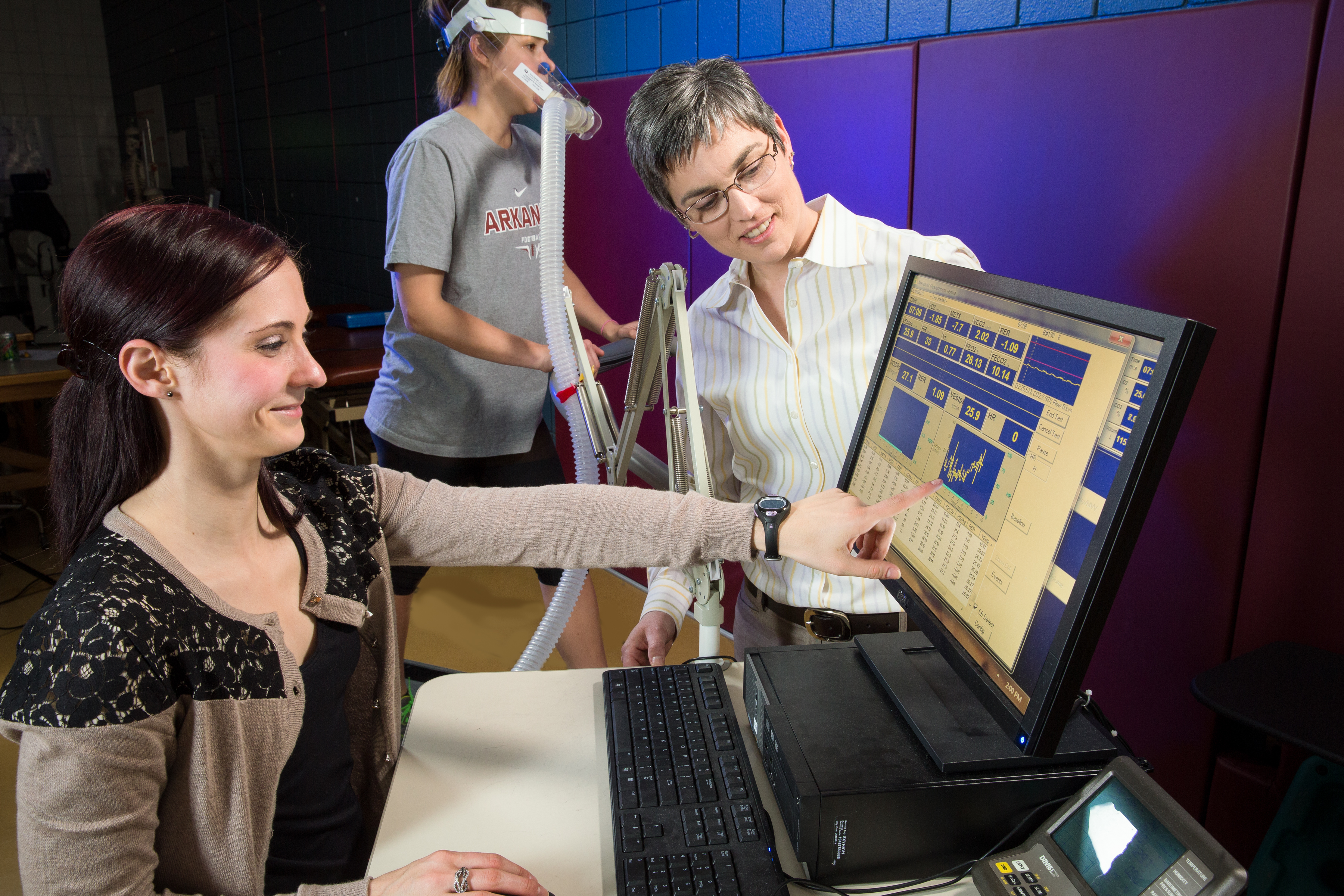Protein Followed by Exercise is Recipe for Calorie-Burning Success in Some Women

University of Arkansas graduate student Ashley Binns (left) and Michelle Gray, an assistant professor of kinesiology, collaborated on a study that found for some women, a high-protein meal followed by moderate exercise is an effective way of burning calories.
FAYETTEVILLE, Ark. – New research shows that for some women, a high-protein meal followed by 30 minutes of moderate exercise is an effective way of burning calories, especially when compared to exercising on an empty stomach.
Exercise scientists at the University of Arkansas describe their findings in a study that has been accepted by the Journal of Science and Medicine in Sport, with the title, “Thermic effect of food, exercise, and total energy expenditure in active females.”
Ashley Binns, a doctoral student in kinesiology and exercise science who led the study, said the goal was to determine the interaction between the thermic effect of food and exercise on the body’s total energy expenditure, as measured in calories. Thermic effect is the amount of energy that it takes to digest, store and utilize the food we eat.
“We looked at the effects of protein consumption alone on total energy expenditure, and protein consumption combined with exercise,” Binns said. “We found that with exercise, there is a trend for a continued increase in caloric expenditure with higher protein consumption. Additionally, the consumption of the high- or low-protein meals resulted in greater energy expenditure than the fasted state. That means that eating prior to exercise does provide fuel to burn, making us more like an energy-burning machine.”
Binns co-authored the paper with her graduate adviser, Michelle Gray, an assistant professor of kinesiology, and Ro Di Brezzo, a University Professor of kinesiology.
“To my knowledge, this is the first study of its kind,” Gray said. “What Ashley found is important because of the growing problem of obesity in the United States. If simple changes can increase our energy expenditure, then they may have a large impact on weight loss or weight maintenance.”
Ten active college-age women of normal body weight participated in the study. For their testing sessions, they were given a high-protein meal, low-protein meal, or no food at all, before walking on a treadmill.
Binns selected these women because they were “recreationally active,” which meant that they normally exercised at least twice a week, but they weren’t athletes or severely overweight.
“Studies involving high-protein diets and low-protein diets have typically examined the extremes: athletic populations and morbidly obese individuals,” Binns said. “I wanted to see what the thermic effect of food was like for a normal individual, who didn’t have any metabolic disorders or medications that would affect their metabolism.”
Exercise was key to the study, Binns said, because high-protein diets without exercise can lead to muscle loss.
“With just a high-protein diet and no exercise, the body heats up to break down the protein but what also happens is it breaks down muscle,” she said. “You have individuals who are losing weight on a high-protein diet because their metabolism is increasing. The body first burns fat but then it also starts to burn muscle as fuel. We want to see individuals keep their muscle mass with a high-protein diet so that they are more energy efficient.”
Binns holds two bachelor’s degrees and a master’s degree, all from the U of A. As an undergraduate, she was a dual major in nutrition and kinesiology, with a concentration in fitness specialization.
She intends to apply findings from the thermic effect study — the results of which constituted her master’s thesis — to her current interests, which focus on aging research and education with an emphasis on the interactive effects of protein consumption and exercise to reduce the deleterious effects of sarcopenia, the loss of muscle mass and strength associated with age.
Topics
Contacts
Ashley Binns, doctoral student, kinesiology and exercise science
College of Education and Health Professions
479-575-6762,
binns@uark.edu
Michelle Gray, assistant professor of kinesiology
College of Education and Health Professions
479-575-2975,
rgray@uark.edu
Chris Branam, research communications writer/editor
University Relations
479-575-4737,
cwbranam@uark.edu
Headlines
Affairs of the Heart
Find out how biomedical engineering professor Morten Jensen is developing innovative devices to produce better outcomes in cardiovascular medicine.
Students, Faculty and Alumni Kick Off Centennial Year of School of Law
Founded April 14, 1924, the School of Law faculty, students and alumni started the celebration of its centennial year with a Founders Day event and will continue with more commemorative events this coming fall.
Yearly Academic Award Winners, Ambassadors Recognized by Bumpers College
Schyler Angell, Lexi Dilbeck, Cason Frisby, Tanner Austin King, Anna Brooke Mathis, Carrie Ortel, Lucy Scholma, Kadence Trosper and student ambassadors were honored at the college's annual reception.
World Premiere of 'Cries from the Cotton Field' Slated for May 8
Cries from the Cotton Field chronicles the journey of 19th century Italian immigrants from northern Italy to the Arkansas Delta and ultimately to Tontitown. It will premier at 6 p.m. May 8 in Springdale Har-Ber High School.
Fay Jones School's Earth Day Event Spotlights Sustainable Materials and Projects
"One day doesn't seem like a lot, but one day can empower individuals and groups, energize them to work for change and innovate for transformative solutions," professor Jennifer Webb said of the students' design work.




